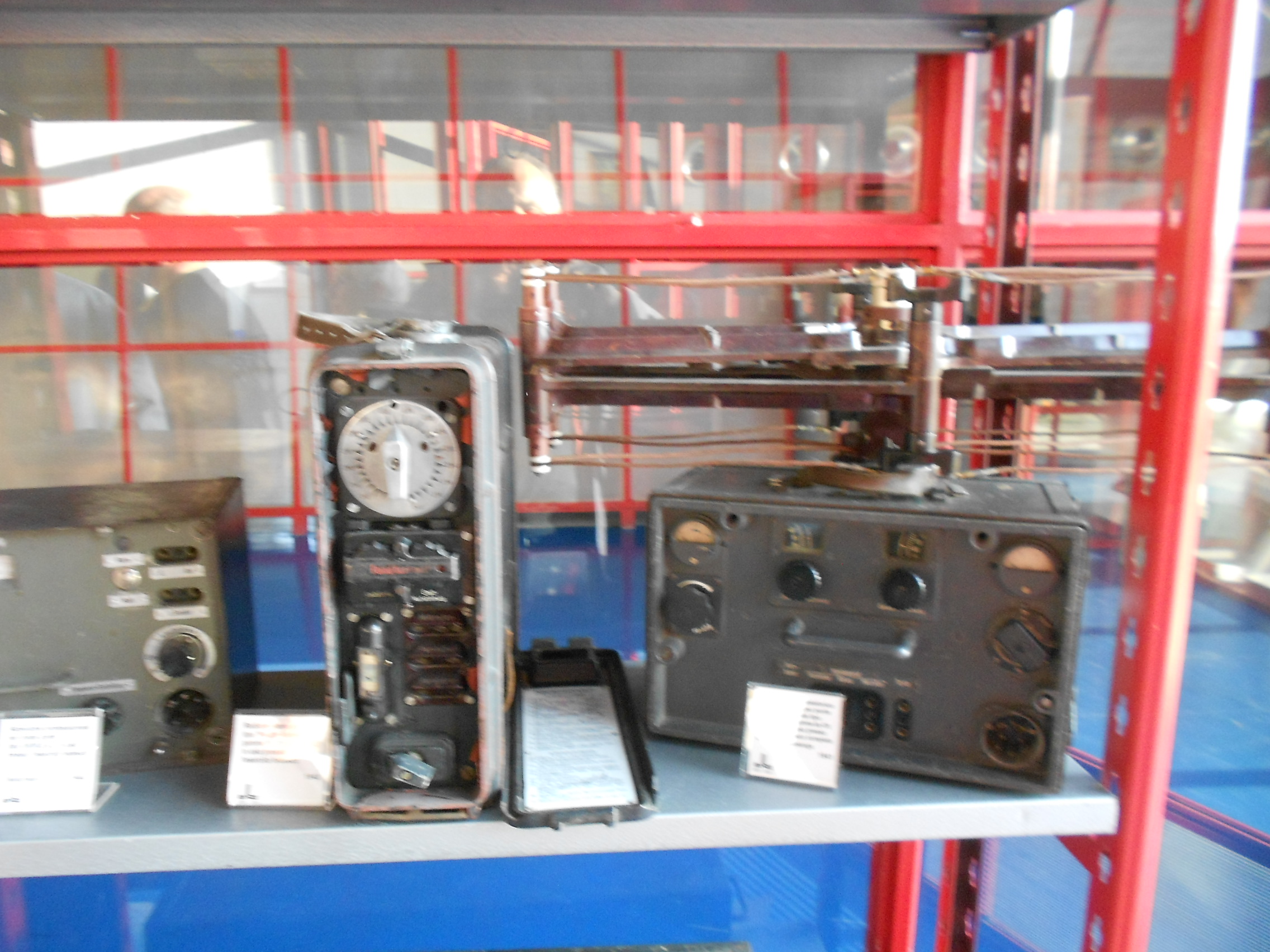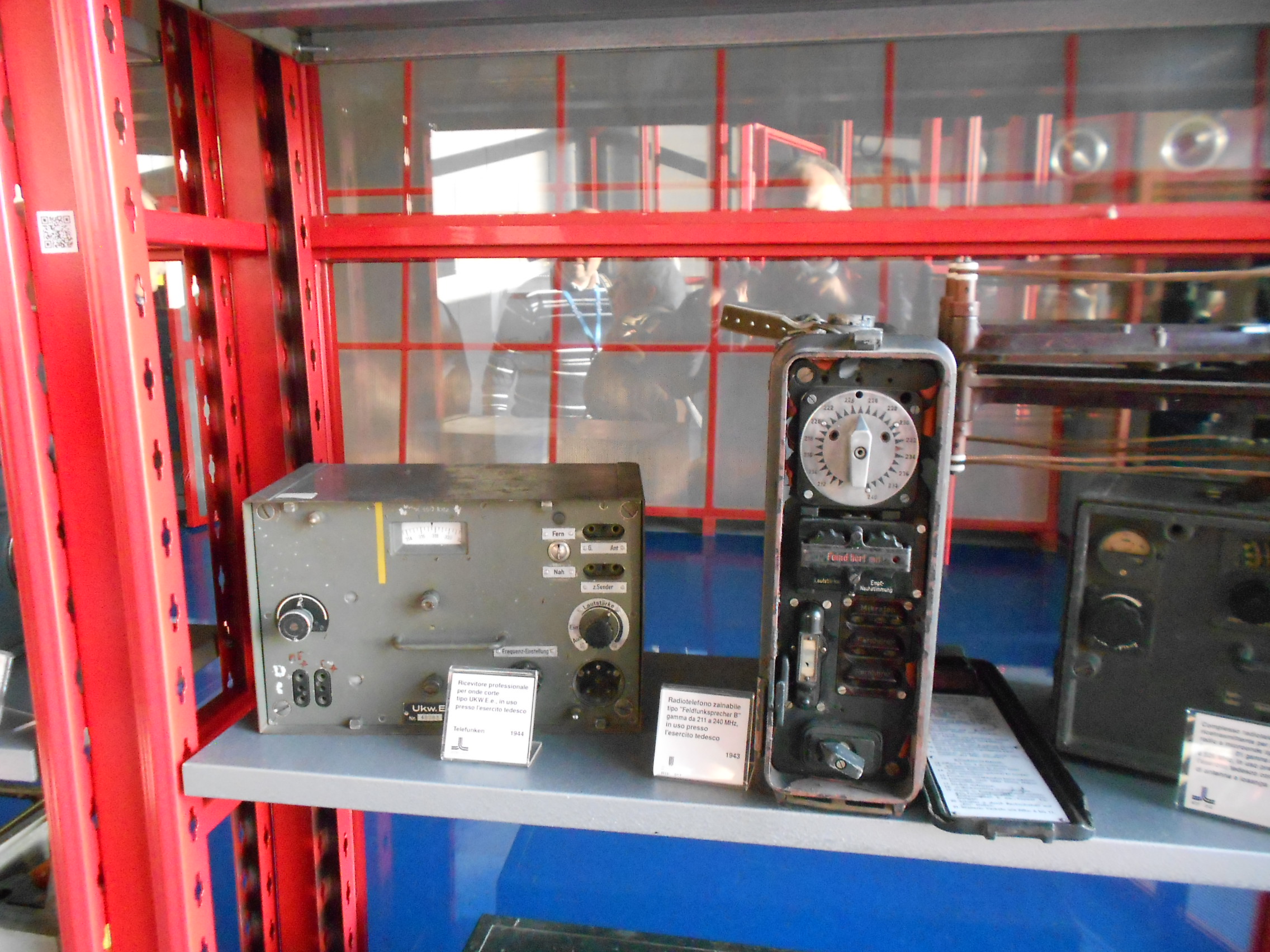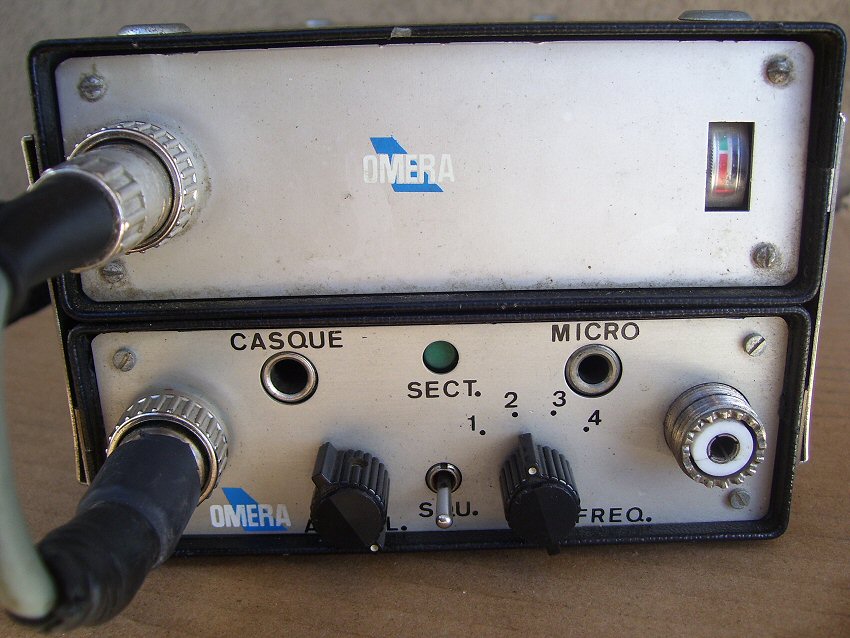| WEHRMACHT |
RTX FFS B
RadioTelefono Zainabile Feldfunksprecher B
1943 Esercito Tedesco
banda 211-240 Mhz
|

RTX FFB RadioTel Zainabile feldfunksprecher B
1943 211-240 Mhz |

RTX FFB RadioTel Zainabile feldfunksprecher B
1943 211-240 Mhz |
RTX PPP
Radio Telefono Portatile WWII
Esercito Tedesco
|

RTX PPP Radio Telefono Tedesco WWII Sezione ANGeT MI
2007-01-27 DSC00694 1
|
|

RTX FFB RadioTel Zainabile feldfunksprecher B
1943 211-240 Mhz Scheda Tecnica
|

RTX FFB RadioTel Zainabile feldfunksprecher B
1943 211-240 Mhz |

RTX FFB RadioTel Zainabile feldfunksprecher B
1943 211-240 Mhz |
|
|
|
RX UKW-E 1944
Telefunken Ricevitore Professionale
Onde Corte OC

|

RX UKW-E Telefunken 1944 Ricevitore Professionale OC
PV-15 3923 scheda tecnica ARI Vigevano |

RX UKW-E Telefunken 1944 Ricevitore Professionale OC
PV-15 3923 scheda tecnica ARI Vigevano |
RX LWE 1941
Radio Ricevitore Tedesco
|

RX LWE Ricevitoreradio Tedesco 5 bande PV-15 3924 1 ARI Vigevano
|
|
RX XXX
Radio Ricevitore Tedesco 1941
|

RX XXX Ricevitoreradio Tedesco PV-15 3925 1 ARI Vigevano
|
|
RTX YYY
Stazione Radio Tedesca WWII
|

RTX YYY Radio Militare Tedesca WWII |
|
RTX-ZZZ

RTX ZZZ WWII Sezione ANGeT MI 2007-01-27 DSC00694 1 |

RTX ZZZ WWII Sezione ANGeT MI 2007-01-27 DSC00698 1 |

RTX ZZZ WWII Sezione ANGeT MI 2007-01-27 DSC00707 1 |
|
|
|
RTX HHH 1941
in uso Esercito Tedesco
|

RTX HHH 1941 2015-11-07 PV DSCN3914 ARI Vigevano scheda tecnica |

RTX HHH 1941 2015-11-07 PV DSCN3914 ARI Vigevano |
Kw.E.a Radio Receiver
|
Wehrmacht
Military WWII Radio Receiver Kw.E. This is a highly sophisticated
11-tube super-heterodyne receiver designed for use in command centers
and in large communication vehicles. At 90 lbs, it's a struggle
for 2 people to carry it. It is extremely sensitive and may
be considered the best super-heterodyne receiver produced by the
Telefunken firm in preparation for the Second World War.
|
VIDEO Youtube

|
E52-b2 etherodyne receiver
(covered 4 frequency ranges,
from 40 KHz to 150 MHz -
they were called Leipzig, Köln, Ulm and Kulm)
|
In 1939, the
German Office of the Armed Forces, provided requirements and
specifications for a new generation of receivers. These
specifications guaranteed the operating effectiveness of this new
receiver for 10 to 15 years into the future. The
German electronics juggernaut Telefunken, produced the first design of
the E-52 heterodyne receiver. This design was top secret,
and described 4 different receivers that covered 4 frequency ranges,
from 40 KHz to 150 MHz - they were called Leipzig, Köln, Ulm and
.Kulm The Lipzig and the Kulm were never manufactured other than
prototypes. The Köln was manufactured and so was the Ulm,
but in smaller numbers. These receivers were manufactured
from late 1942 through 1945. Only about 50 of these devices
exist in untouched condition. These receivers were the crowning
achievement of German war-time engineering, clever design, manufacture
and of most importance - performance. Only in the 1960s, did the United
States military get to use receivers that are comparable to the
Köln. This design was 20 years ahead of its
time. Some of the features this receiver had were: +
Modular construction: all circuit blocks were modules that
plugged into a back-plane motherboard. Each module could be
removed individually and serviced separately.
+ Projection Scale: The entire frequency scale was photo printed
microscopically onto a glass disk. An intricate
mirror-lens-light arrangement projected the frequencies onto a screen.
+ Ultra high sensitivity and selectivity
+ Diverse power supply: the power supply could handle outlet power of most countries along with a 12 volt battery
|
VIDEO Youtube
 |
Testing German Wehrmacht Command Panzer Radio Transmitter "80 Watt Sender a" 80W.S.a - part 2
|
This
transmitter was used in command tanks and armored vehicles by the
German Wehrmacht in WWII. Along with the Mw.E.c receiver,
it was part of the Fu8 configuration. The frequency range was
from 1120 - 3000 kHz. This test was conducted using an
original Umformer (dynamotor) U80a, and a 12 volt car battery to power
it. This is how this transmitter was powered in an armored
vehicle.
|
Video Youtube
|
Torn E b Radio Receiver
|
Torn.E.b, German WW2 radio receiver test. This is a demo of Torn.Eb shortwave receiver from WW2.
This has a great mechanical design. See it on the film.
The sound is also very good. Hear it on the film.
|
Video Youtube |
Torn.Fu.a2 Tranceiver
|
First test of Torn.Fu.a2
Tranceiver used in OL Berlin 1936. Torn.Fu.a2, German Tranceiver used
in OL Berlin in 1936. My first QSO with this radio on CW and AM
|
Video Youtube |
Torn Fu b 1 SSB 80 m
|
In den Jahren 1935 bis 1936
entwickelte die Firma Lorenz drei optisch sehr ähnliche
Tornisterfunkgeräte, darunter das Torn Fu b1 mit einem Frequenzbereich
von 3-6,66 MHz
und einer Sendeleistung von ca 0,6 Watt. 2 Mann mussten die Anlage
schleppen, je ca 23 kg wogen das Gerät selbst und auch der
Zubehörtornister mit Batterien, Kopfhörern, Morsetaste udgl. Im Video
hört man verschiedene Amateurfunkstationen auf dem 80 m Band
|
Video Youtube |
Torn.Fu.b1
|
Torn.Fu.b1 CW QSO with originale
antenna. In this film I show a CW QSO with the original antenna mounted
on top of the radio. Fantastic good result.
|
Video Youtube |
Tonschreiber Ton S.b1 Tape Recorder
|
This is the world’s “first” tape-recorder. All other professional tape recorders are a copy of this machine.
This is my first test of this machine. More videos comes
later. Fantastic to see this up and running, inspires me to have
another go at mine, have you tried the rotating magnetic head system
yet? I believe it was designed to work with high speed mores code. The
S.B.1 is very old but not the first, the first practical machine was
the AEG Magnetophon K1 in 1935 thought the S.B.1(From 1939 - 1944) was
the one used as a blueprint by first Ampex in the US with the 200 and
then shortly after the British with the EMI BTR-1
|
Video Youtube
|
Schwabenland Lorenz Ln 21021 EO8268 ricevitore
documento docx
|

|
radiomentor.pdf
Video Youtube
|
Scaffali di Radio
|
   |
|
Radio militare tedesca WWII Museo Guernsey
stazione-radio-a-la-valette-underground-museo-
militare-nella-basilica-di-san-pietro-porto-di-
guernsey-nelle-isole-della-manica-e-la-gran-bretagna-
|
  
|
Link Web
|
Radio Militare Wehrmacht WWII ????
|

|
|
| Radio Militare Wehrmacht WWII ???? |
   |
  |
| Radio Militare Wehrmacht WWII ???? |
|
|
| Radio Militare Wehrmacht WWII ???? |
  |
  |
|
|
|
|
|
|
KRIEGSMARINE
|
Lorenz LO6L39 Ricevitore Onde Lunghe , 100WS and Lo6L39 QSO on 630 meter, 472 kHz
|
472 kHz QSO with old WW2 German radio.
100WS and Lo6L39.
|
Video Youtube
|
Lo6K39aRicevitore Onde Corte , German WWII Kriegsmarine Military (Naval) Radio Receiver Lo6K39a in Operation
|
his short wave receiver was
manufactured for the Kriegsmarine by the Lorenz company. It weighs 65
kg (143 lbs). It was used on battleships like the Prinz Eugen or the
Bismark, and it was used in u-boats. Many coastal ground stations also
used this receiver. Rommel's Afrika Korps used the Lo6K39a as well
because of its incredible sensitivity to intercept enemy transmissions.
This is one of the most sensitive short wave receivers ever built, and
it must have cost the Germans a large sum per unit. Like with many
other radio sets produced specifically for the military, the amount of
intricate hand assembly and precise engineering used here is unequaled
for that time period. The purpose for this receiver's design is very
unique. It is a Tuned Radio Frequency receiver for a reason. On
superheterodyne receivers, the oscillator generates a weak signal at
the required intermediate frequency. There is a danger, however small,
that this signal escapes the receiver through the antenna, and will be
triangulated by enemy direction finders.
|
Video Youtube
|
|
|
|
| LUFTWAFFE |
|
|
|
Fug10 WW2 German Aircraft tranceiver AM
|
Fug10 WW2 German Aircraft tranceiver AM modulation. FUG10 German WW2 Aircraft tranceiver.
AM operation, E10K, S10K
|
Video Youtube |
|
|
|
| GERMANIA ALLEANZA NATO |
ER-219A OMERA
Ricetrasmettitore portatile VHF
Ricetrasmettitore VHF in banda aeronautica da 118 a 136Mhz in AM. Programmabile su 4 canali quarzati (non forniti). Vedi foto
Alimentazione a pile interne ( 10 torcie da 1,5v). Vedi foto
Viene venduto con la sua borsa di trasporto, antenna originale e microfono |

OMERA mod. ER-219A Ricetrasmettitore portatile VHF |

OMERA mod. ER-219A Ricetrasmettitore portatile VHF 1 |

OMERA mod. ER-219A Ricetrasmettitore portatile VHF |
|

OMERA mod. ER-219A Ricetrasmettitore portatile VHF |
|
|
|
TELEPORT VI
Ricetrasmettitore Telefunken
Ricetrasmettitore costruito dalla Telefunken
per la banda aerea civile 105Mhz accessori e tappo del contenitore batterie |
??

TELEPORT VI Ricetrasmettitore
|
banda aerea civile 105Mhz
AM o FM ?
|
TELEPORT 9-80
FuG 13b
Ricetrasmettitore di controllo militare AEG
Ricetrasmettitore per comunicazioni militari con crittografia vocale, banda 4 Metri (80 mhz) Potenza regolabile da 1 a 5W,
display a 8 cifre con tre caratteri speciali. Completo di cinghia trasporto, antenna e pacco batterie |
??

Teleport 9-80 FuG 13b Ricetrasmettitore di controllo militare AEG
|
crittografia vocale,
banda 4 Metri (80 mhz)
Potenza regolabile da 1 a 5W
AM o FM ?

Teleport 9-80 FuG 13b Ricetrasmettitore
di controllo militare AEG scheda tecnica
|
|
|
|
|
|
|
|
USE 202 HAGENUK
Ricetrasmettitore VHF Marino
Radiotelefono in banda marina da 156-162 Mhz Opera su 55
canali internazionali. Display LED per visione del numero di
canale Alimentazione a 220Volt, potenza in antenna 15-25W |
??

HAGENUK USE 202 ricetrasmettitore VHF marino
|
banda marina da 156-162 Mhz
55
canali internazionali
potenza in antenna 15-25W
AM o FM ? |
|
|
|
SEM-25
Ricetrasmettitore
Frequenza da 26 - 69,95 mhz in FM
Potenza in uscita circa 15 w. Impostazione
della frequenza a scatti di 50 Khz.
Alimentazione con ingresso a 24Vcc. |
FM

SEM-25 Ricetrasmettitore
|
26 - 69,95 mhz in FM
Potenza in uscita circa 15 w. Impostazione
della frequenza a scatti di 50 Khz.
|
SEM 35
Ricetrasmettitore
Frequenza da 26 - 69,95 Mhz in FM potenza in uscita circa 1 W
.Impostazione della frequenza a scatti di 50 Khz.
Alimentazione a 24Vcc o con 12 batterie
1/5 torcia entrocontenute.Completo di
alimentatore/portabatterie. |
FM

SEM-35 Ricetrasmettitore
|
da 26 - 69,95 Mhz in FM potenza in uscita circa 1 W
.Impostazione della frequenza a scatti di 50 Khz.
|
Ponte radio in UHF da 1350 - 1850 Mhz
Alimentazione 220 VoltAC - 24VolDC |
??

MH-197 MARCONI MH-197 Ricetrasmettitore PonteRadio
|
AM o FM ?

MH-197 MARCONI MH-197 Ricetrasmettitore PonteRadio interno
|
SU115 Rohde Schwarz Trasmettitore FM Stereo
Trasmettitore in FM programmabile a pll
Range da 87 a 109 Mhz step 10 Khz
Ingresso modulazione mono o stereo,
potenza in uscita regolabile da 1 a 20 W max.
Alimentazione 220 Volt cc. |
FM

TX SU115 ROHDE & SCHWARZ Trasmettitore FM STEREO
|
|
Telefunken E863 KW/2 Marine
Kurzwellen-Empfänger (engl. subtitles).Telefunken E863 KW/2 Marine
Kurzwellen-Empfänger (engl. subtitles)
|
Telefunken E863 KW/2 1,5 Mhz - 30 Mhz 8 bandwidths (6 + USB/LSB) Very good crisp sound
Marine shortwave receiver from 1971 Weight 22 kg Very
sensitive receiver with nice warm nixie tubes. Very smooth and silent
dial with mechanical gear (push). Extra fine tuning within a range of
50 hz!
|
Video Youtube
|
SIEMENS E311b
|
SIEMENS E311b SIEMENS E311b -
ricevitore 1,5/30 Mhz, Stunning, the synch lamp is not on ( above the
analog display - on the E311b here). It should.Outstanding receiver, in
CW as well.One can hear overdrive/non-linearities effects though .
Needs reducing HF gain then.Own experience & measurements.
|
Video Youtube |
Siemens E311e IJL - Siemens E311e liikeennevastaanottimen esittely ja kunnostus - osa 1
|
Saksalaisvastaanottimien
sarjassa on nyt kevyempi malli eli vain 26 kg painava Siemens E311e.
Ensimmäisessä videossa tutustutaan pääasiassa laitteen etupuolen
säätimiin jne, mutta saadaan lopussa jo laite ulos kotelostakin… Ajalta
jolloin Saksalainenkin vielä käytti UHF-liittimiä ammattilaitteissa...
|
Video Youtube |
Siemens E311 E1 Receiver (1959)
|
Siemens E311E1 Receiver. This
receiver was designed in 1959 for AM, CW, FSK and SSB reception. It was
widely used by different government authorities and in military
applications. It could be found on board of most German ships in the
Sixties and Seventies. As a tube receiver the E 311 has an incredible
setting accuracy of 100 Hz and an impressive stability of 20 Hz over 24
hours. The tuning scale has an effective length of 285 m (935 feet).
Excellent for AM reception in an ECSS mode as well. The E 311 is
probably one of the best tube receivers for FSK and SSB ever built.
|
Video Youtube
|
Siemens E311 E1 Receiver (1959)
|
IK5DEZ - Panoramica stazione radio più ricevitore SIEMENS E311 versione "e1"
IK5DEZ- INORC, panoramica della stazione radio più ricevitore SIEMEN E311 versione "e1"
|
Video Youtube
|











































